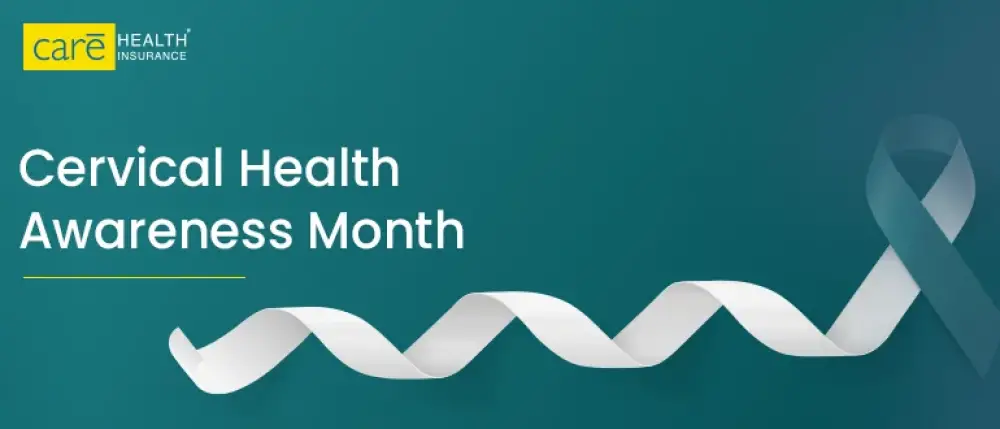Subscribe to get weekly insights
Always stay up to date with our newest articles sent direct to your inbox
Published on 9 Jan, 2025
Updated on 9 Jan, 2025
145 Views
3 min Read

Written by Jyotsana Shekhawat
Reviewed by Akhil Pillai
0Like
Be the First to Like
January is Cervical Health Awareness Month, a crucial time to focus on cervical cancer prevention and the significance of screening. While cervical cancer remains one of the leading causes of cancer-related deaths in women worldwide, early detection through regular screenings can drastically improve outcomes and save lives. This month provides a perfect opportunity to highlight the importance of getting screened and staying informed about cervical cancer awareness.
Cervical Health Awareness Month is an annual reminder to prioritise cervical cancer screenings. Early detection is vital to prevention..Throughout January, healthcare providers, advocacy groups, and communities join forces to educate and empower individuals about cervical cancer prevention, screenings, and the HPV vaccine.
Cervical cancer develops when abnormal cell growth occurs in the cervix. The primary cause is a persistent infection with HPV (Human Papillomavirus), a common sexually transmitted virus. Other risk factors include age, smoking, a weakened immune system, and long-term use of birth control pills. However, HPV remains the leading cause. Without treatment, abnormal cervical cells can become cancerous over time.
Common symptoms of cervical cancer include abnormal vaginal bleeding, pelvic pain, or pain during intercourse. However, early-stage cervical cancer is often asymptomatic, emphasising the importance of regular cervical cancer screening.
Cervical cancer screening tests, such as the Pap smear and HPV test for women, is essential for detecting precancerous changes in the cervix before they progress into cancer. Regular screenings can identify cervical infections, abnormal cells, or HPV infections- all potential onset of cervical cancer.
The cervical cancer screening tests enable healthcare providers to assess any cervical changes that may require further investigation or treatment. HPV testing is especially valuable for identifying high-risk strains of HPV linked to cervical cancer. Early detection significantly increases the chances of successful treatment.
The link between HPV and cervical cancer is undeniable. Nearly all cases of cervical cancer stem from persistent infections with high-risk HPV strains. Vaccination is a powerful tool for preventing these infections. The HPV vaccine protects against the most common strains of the virus, significantly reducing the risk of developing cervical cancer.
The HPV vaccine is recommended for both boys and girls at ages 11 or 12, and catch-up vaccination is available for those up to age 26. The vaccine is most effective when given before any exposure to HPV, ideally before individuals become sexually active.
Beyond regular screenings, healthy lifestyle choices can lower your cervical cancer risk. These include quitting smoking, eating a healthy diet, and using barrier methods like condoms to reduce the risk of HPV infection. Additionally, the cervical cancer vaccine is a vital preventive measure for those who are eligible.
There are several effective methods of cervical cancer prevention that can significantly reduce the risk of developing this disease. By incorporating these preventive measures, women can significantly reduce their risk of developing cervical cancer.
During Cervical Health Awareness Month, let's prioritise our well-being by understanding the importance of cervical cancer screening, the HPV vaccine, and early detection. By raising awareness about cervical cancer prevention, we can empower individuals to take control of their health and reduce their risk of this preventable disease. Alongside preventive care, it’s just as crucial to have the right health insurance to support your healthcare needs. Opt for the best Cancer mediclaim policy and stay ahead of the medical expenses—and worries.
>> Also Read: Cervical Cancer Symptoms, Diagnosis and Treatment
Disclaimer: The above information is for reference purposes only. Kindly consult your general physician for verified medical advice. The health insurance benefits are subject to policy terms and conditions. Refer to your policy documents for more information.
Be the First to Like
शुगर कंट्रोल कैसे करे? जानें, डायबिटीज में क्या खाना चाहिए Care Health Insurance in Health & Wellness
Thyroid : मामूली नहीं हैं महिलाओं में थायराइड होना, जानें इसके लक्षण और घरेलू उपचार Care Health Insurance in Diseases
हाई ब्लड प्रेशर को तुरंत कंट्रोल कैसे करें? देखें इसके उपाय Care Health Insurance in Diseases
प्लेटलेट्स की कमी के लक्षण, कारण और इलाज क्या है Care Health Insurance in Diseases
World Chagas Disease Day: Understanding Global Health Impact of Kissing Bugs Care Health Insurance in Awareness Days
World Parkinson’s Day: Raising Hope for the Elderly Care Health Insurance in Awareness Days
World Bipolar Day 2025: Understanding Bipolar Disorder and Breaking Stigma Care Health Insurance in Health Insurance Articles
ट्यूबरक्लोसिस (टीबी) के लक्षण, कारण और इलाज Care Health Insurance in Awareness Days